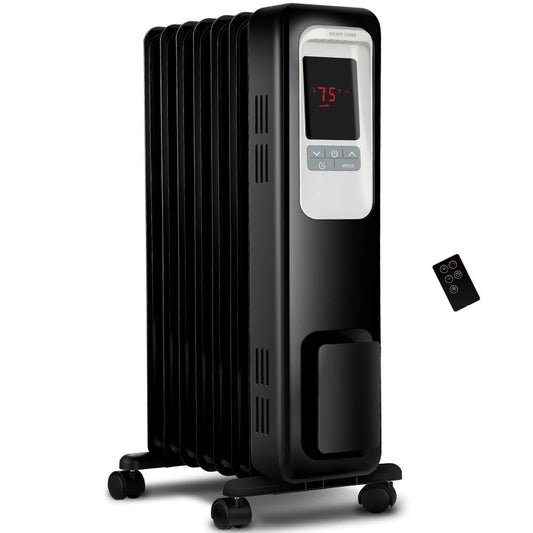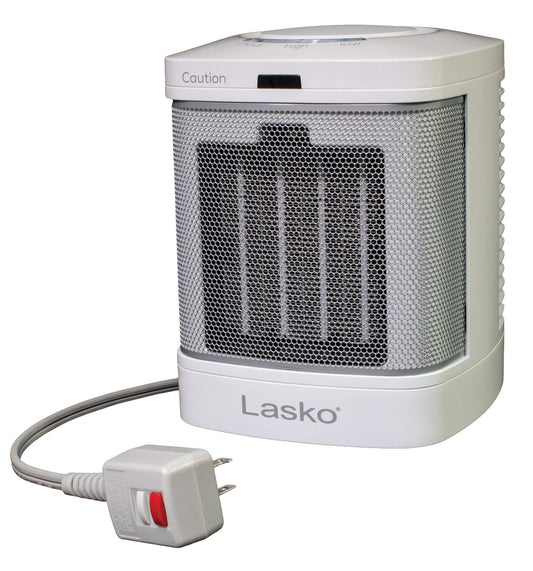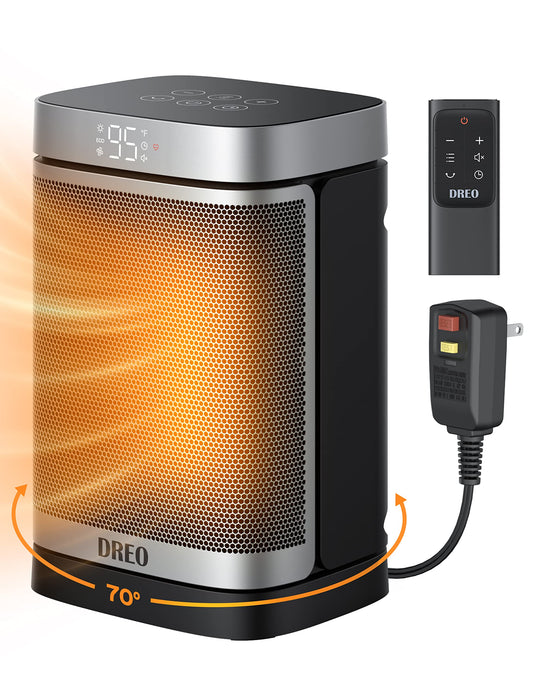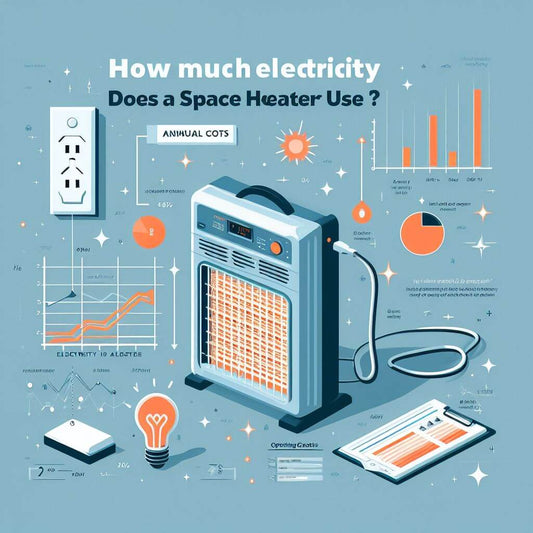How Much Does It Cost to Run a Space Heater?
Summary
Running a space heater can cost anywhere from $0.03 to $0.15 per hour, depending on the type, size, and efficiency of the heater, as well as the electricity rates in your area.

Some links affiliate links that we may earn a commission.
As winter approaches and temperatures drop, many households turn to space heaters to provide supplemental warmth and comfort. However, most people don't realize that running a space heater can add significantly to monthly energy bills. By understanding the factors that influence space heater costs, you can make informed decisions about efficient and affordable usage. This article will break down the key considerations regarding wattage, electricity rates, usage patterns, and energy-saving strategies that impact the true cost of operating a space heater.
Understanding Space Heater Wattage and Its Impact on Cost
At its core, operating a space heater comes down to consuming electricity. The rate of electrical energy consumption is measured in watts. To operate, a space heater must convert watts into heat. As such, the wattage rating directly correlates to how quickly a space heater can heat up a room. Higher wattage equals faster heating.
However, higher wattage also means higher energy use. A common dilemma is deciding between a lower wattage for efficiency or a higher wattage for faster warmth. Most standard space heaters range from 750-1500 watts. Smaller "personal" heaters may use only 100-300 watts. On the other end, heavy-duty garage heaters can use 2500-5000+ watts.
To determine the cost implications of wattage, you'll also need to consider the electricity rate charged by your utility provider. The cost is typically expressed as cents per kilowatt-hour (kWh). A kilowatt-hour equals using 1000 watts for 1 hour. By calculating wattage multiplied by usage hours and dividing by 1000, you can find the kWh consumption. Multiplying kWh usage by the rate gives the running costs.
As an example, a common 1500 watt space heater running for 5 hours uses 7.5 kWh (1500 x 5 / 1000). At a rate of 12 cents/kWh, the cost for that 5 hour period would be:
7.5 kWh x $0.12/kWh = $0.90
Therefore, the higher the wattage, the more kWh consumed and the higher the cost. How much does it cost to run a space heater? Below is a table comparing estimated hourly costs for different wattage heaters at 12 cents/kWh:
| Space Heater Type | Wattage | Hourly kWh Use | Hourly Cost at 12 cents/kWh |
|---|---|---|---|
| Personal Heater | 150 | 0.15 | $0.02 |
| Mid-size Heater | 750 | 0.75 | $0.09 |
| Standard Heater | 1500 | 1.5 | $0.18 |
| Large/Garage Heater | 2500 | 2.5 | $0.30 |
| Industrial Heater | 5000 | 5 | $0.60 |
As shown, operating higher wattage heaters for extended periods can significantly increase costs. Carefully consider the rated wattage and your usage habits when selecting a space heater.
Delving into Electricity Rates and Their Influence on Costs
The regional electricity rate you're charged has a major influence on the cost of operating a space heater. Average rates in the United States range from 10 to over 30 cents per kWh, depending on location. Many factors impact local energy rates, including:
- Energy costs - The prices utility companies pay for natural gas, coal, and other fuels gets passed on to consumers through rates. Areas with higher energy costs have higher rates.
- Infrastructure expenses - Upgrading and maintaining power plants/grids and related infrastructure costs billions annually. These costs are recouped via electricity rates.
- Supply and demand - Rates increase when electricity demand grows higher than supply capabilities. High-population and extreme weather regions often face supply limitations.
- Regulations - Local policies focused on clean energy and reliability shape rate structures. Regulations can raise rates but also incentivize conservation.
- Delivery charges - Fees for transmission, distribution, and metering add to the base electricity rate. Rural areas with significant infrastructure needs tend to have higher delivery fees.
Depending on your location, rates may also vary seasonally or by tiered usage levels set by the utility. Understanding your local rate structure provides the foundation for estimating costs. Multiplying the rates by your expected hourly usage gives the clearest picture of space heater expenses.
Here's an example cost calculation using different electricity rates:
- 750 watt heater, 5 hours of use per day
- Usage per day = 750 watts x 5 hours = 3.75 kWh
- At 10 cents/kWh = 3.75 kWh x $0.10/kWh = $0.38 per day
- At 20 cents/kWh = 3.75 kWh x $0.20/kWh = $0.75 per day
- At 30 cents/kWh = 3.75 kWh x $0.30/kWh = $1.13 per day
As shown, the same heater usage results in significantly higher daily costs in high-rate regions. Checking your local rate and doing the math is key.
Calculating the Cost of Running a Space Heater
Now that we've covered wattage and rates, let's walk through a complete example of how to calculate real-world costs for your space heater usage. Follow these steps:
- Check the wattage - The manufacturer label on the heater will display the rated wattage. Standard heaters are commonly 1500 watts, but verify yours specifically.
- Find your electricity rate - Check your latest utility bill or call your provider to get the accurate rate in cents/kWh. If tiered, use the highest tier you expect to reach.
- Estimate usage time - Track how many hours per day you normally use the heater. Be honest! Usage directly drives energy consumption.
- Calculate kWh use - Take the wattage and multiply by usage hours, then divide by 1000 to get kWh consumed.
- Multiply by electricity rate - Take the kWh usage and multiply by the cents/kWh rate to get the daily cost.
Let's work through an example:
- 1500 watt space heater
- Electricity rate = 12 cents/kWh
- Usage = 5 hours per day
- 1500 watts
- 12 cents/kWh
- 5 hours
- 1500 x 5 / 1000 = 7.5 kWh
- 7.5 kWh x $0.12/kWh = $0.90 per day
For 30 days, the monthly cost would be approximately $27. Getting seasonal or all-year costs involves simply multiplying by the number of days used and making any rate adjustments across billing cycles. While individual days may seem insignificant, costs add up over weeks and months of steadier usage.
Strategies for Minimizing Space Heater Running Costs
Now that you know how to calculate the costs, here are some tips to minimize energy usage and expenses while still staying warm:
- Lower the thermostat - Every degree cooler can reduce heater runtime by up to 5%. Set to 60-65°F when home and even lower when away.
- Use a timer - Use built-in timers or smart plugs to automatically turn the heater off when not needed. Avoid all-day heating.
- Maintain your heater - Clean filters and vents regularly for maximum efficiency. Replace old space heaters with new Energy Star models.
- Insulate rooms - Prevent heat loss by sealing drafts and insulating walls/ceilings. Focus on frequently occupied rooms.
- Use blankets - Layer on blankets and slippers to stay cozy. Save the heater for when you're less active.
- Supplement with other heat sources - Take advantage of passive solar heat, wood stoves, and even your oven/stove when cooking.
- Close doors and vents - Prevent heat spreading to unused rooms by closing doors, registers, and heating ducts. Only heat occupied spaces.
- Use zone heating - For larger areas, use multiple smaller units to heat only sections instead of one large heater.
With some diligence about your usage habits and following these tips, you can achieve a warm and cozy home while avoiding energy waste and sky-high bills.
Conclusion: Making Informed Heating Choices
Operating a space heater seems simple enough - just plug it in and enjoy the warmth. However, as we've explored, many variables influence the true costs related to your specific heater usage and electricity rates. By learning how to calculate your estimated hourly, daily, or monthly costs, you can make informed decisions about appropriate space heater usage for your home.
Be sure to select an appropriately sized heater for the spaces you want to heat and consider upgrades to more efficient Energy Star models. Use the strategies listed above to control costs, balancing your comfort with energy conservation. Stay warm in the coming winter months while keeping energy affordability top of mind. With the insights provided in this guide, you now have the tools to unravel the real cost of operating a space heater and leverage that knowledge to make the best heating choices for your home.

















